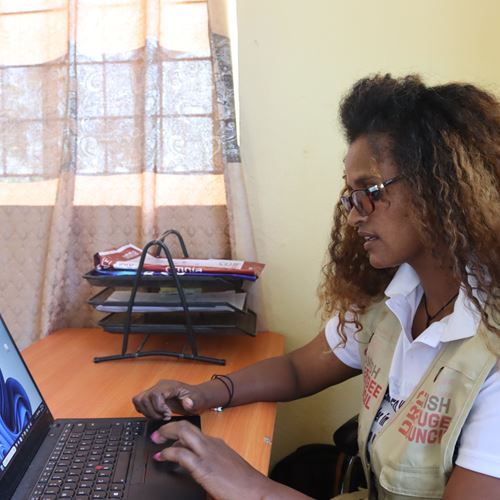How did you become involved in the field of protection?
My educational background and personal interests were the major drivers for me to join the field of protection. After doing a degree in psychology from Jimma University in Ethiopia, my career in the humanitarian sector started at Mekdim Ethiopia National Association, a local NGO. My experience in Mekdim Ethiopia awakened the passion for protection in me, leading me to take up a gender based violence response officer position at International medical Corps (IMC) in Jewi refugee camp in Gambella. Nine years into my service as a protection professional in different positions working for international organizations and a UN Agency, I ensure that refugees and internally displaced people are better protected and able to seek safety and claim their rights. That has become my source of inspiration and satisfaction.
What motivated you to become an advocate for the eradication of violence against women and girls?
My motivation to become an advocate for the eradication of violence against women and girls (VAWG) mainly stems from the distressing consequences of violence against women and girls. Violence against women and girls is a human rights violation, and the immediate and long-term physical, sexual, and mental consequences for women and girls can be devastating, including death. VAWG affects not only the victim’s physical and reproductive health but also their mental and emotional state. It makes them feel ashamed and to lose their self-esteem; threatens their personal security; and curbs their capacity to participate in their communities. The more I realize the impacts of violence on women and girls, the more I became committed to the cause. Advocating for the prevention of violence against women and girls is the least I could do to be part of the solution.
In your experience, what are the most common misconceptions or barriers when it comes to addressing violence against women and girls?
The barriers to addressing violence against women and culture are numerous and may vary from place to place. In my view, the most notable barriers that are persistent in almost all contexts include cultural influence, lack of knowledge/awareness, poverty, substance abuse, lack of immediate action against perpetrators by law enforcement bodies and lack of strong integration between humanitarian organization and law enforcement bodies.
How do you work to raise awareness about violence against women and girls in your community or on a larger scale?
We employ varied methods of awareness creation and raising initiatives with the goal of preventing violence against women and girls. An important platform of these methods is campaigns to mark various international days. The most important of these are International Day of Zero Tolerance to FGM on the 6th of February; International Women’s Day on the 8th of March; World Elder Abuse Awareness Day on 15th of June; International Day for the Elimination of Sexual Violence in Conflict on 19th of June International Day of the Girl Child on the 11th of October; 16 Days of Activism for the Elimination of Violence Against Women and Girls, November 25-10th December; and Human Rights Day on the 10th of December. In DRC, the commemoration of these events take place in different refugee and IDP contexts, including Melkadida, Kule, kobe, Terkidi, Zenzelima, Ebinat and other camps. Our most important activity during these events is dissemination of information through community dialogues, dramas, leaflets, banners, poems, speeches by influential local women, matches and competitions and the media. The delivery of effective messages and information dissemination calls for a collaboration with community leaders, local institutions, international & national NGOs, UN agencies, government bodies and community members.
As we commemorate the 16 days of activism, what are some specific policy changes or legal reforms that you believe would make a significant impact in eradicating violence against women and girls?
I advocate for the enactment of substantive and procedural laws related to gender-based violence (GBV) in Ethiopia, emphasizing the importance of specific criminal laws addressing GBV issues.
What advice do you have for individuals who want to get involved in the fight against violence against women and girls?
I encourage individuals to take action today by creating awareness within their communities about GBV prevention and available services. Utilizing various platforms, including social media and face-to-face meetings. We need to emphasize the urgency of the cause and call for collective efforts to prevent violence against women and girls.
